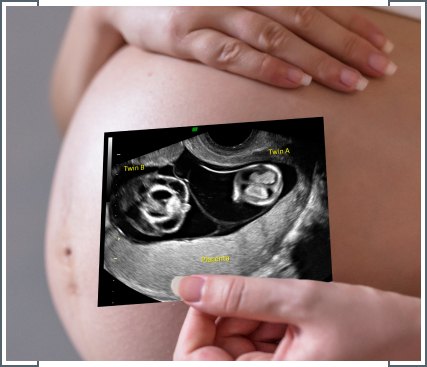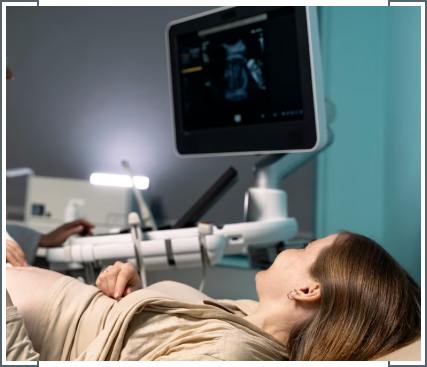Home > For Her Wellness > Prmium Services
Premium Services

Twin-Twin Transfusion Syndrome
Twin-twin transfusion syndrome refers to a condition that occurs in identical twin pregnancies sharing a placenta. It arises when abnormal blood vessel connections in the placenta cause uneven blood flow between the twins. One twin (the donor) transfers blood to the other twin (the recipient), leading to imbalances in amniotic fluid levels and growth. This can result in serious complications such as fetal growth restriction, organ damage and even fetal demise if untreated. Management options include monitoring with ultrasound, fetal intervention procedures to disconnect shared vessels and sometimes early delivery to improve outcomes for both twins.

Ultrasound with middle cerebral artery Doppler evaluation for RH-ISOIMMUNISED pregnancies
Ultrasound with middle cerebral artery Doppler evaluation is crucial in pregnancies affected by Rh isoimmunization. This condition occurs when an Rh-negative mother develops antibodies against Rh-positive fetal blood, potentially leading to fetal anaemia and complications. The Doppler ultrasound assesses blood flow velocity in the middle cerebral artery of the fetus, helping to monitor for signs of anaemia and guide management decisions. Early detection allows doctors to intervene with treatments such as intrauterine transfusions to support fetal blood production and optimize outcomes for both the baby and the mother.


Counselling for genetic disorders
Counselling for genetic disorders involves discussing the risks, implications and options associated with inherited conditions. Genetic counsellors provide personalized guidance, interpreting genetic test results and family histories to assess risks of passing on disorders. They educate individuals and families on genetic inheritance patterns, available testing options and potential medical interventions or preventive measures. Counselling sessions support decision-making regarding family planning, prenatal testing and managing genetic conditions.

Recurrent Pregnancy Loss
Recurrent pregnancy loss refers to the occurrence of two or more consecutive miscarriages before 20 weeks of gestation. It is a distressing condition that affects couples emotionally and psychologically. Causes may include genetic abnormalities, hormonal imbalances, uterine issues, autoimmune disorders or lifestyle factors. Diagnosis involves a thorough medical history, physical exams and testing to identify underlying factors. Management strategies vary based on the cause, including medical treatments, lifestyle adjustments or assisted reproductive technologies (ART).


Bad Obstetric History
Bad obstetric history refers to a series of adverse pregnancy outcomes such as recurrent miscarriages, stillbirths, preterm births or complications during childbirth. It is a complex issue that can result from various factors, including genetic abnormalities, uterine abnormalities, infections, hormonal imbalances or lifestyle factors. Diagnostic evaluation usually involves detailed medical history, physical exams and specialized tests to determine underlying causes. Management strategies aim to address specific issues identified and improve the chances of successful future pregnancies.

H/O past pregnancies with anomalies or genetic syndromes
A history of past pregnancies with anomalies or genetic syndromes refers to previous pregnancies where the fetus was diagnosed with structural abnormalities, genetic disorders or syndromes. This medical history can impact future pregnancies, influencing decisions regarding prenatal screening, genetic testing and reproductive planning. Detailed medical evaluation, including genetic counselling and specialized testing, helps identify underlying causes and assess recurrence risks. Management strategies may involve close monitoring, advanced prenatal diagnostics and consultation with specialists to improve maternal and fetal health outcomes in subsequent pregnancies.


Fetal Neurosonogram
Fetal echocardiography is a specialized ultrasound procedure performed during pregnancy to evaluate the developing baby’s heart. It gets conducted between 18-24 weeks gestation, it assesses the structure and function of the fetal heart, detecting any congenital heart defects or abnormalities. This non-invasive imaging technique provides detailed information to doctors, enabling early diagnosis and management of cardiac conditions before birth.

DNA Cryopreservation
DNA cryopreservation involves preserving genetic material, specifically DNA, by freezing it at ultra-low temperatures for long-term storage. This process ensures the genetic integrity and viability of DNA samples, making them available for future use in various applications such as medical research, genetic testing and potential advancements in personalized medicine. Cryopreserved DNA is securely stored in specialized facilities, allowing for ongoing scientific exploration, diagnostic advancements and opportunities in fields like reproductive health and genetic counselling. This technology holds promise for advancing our understanding of genetics and enhancing healthcare options for individual genetic profiles.

